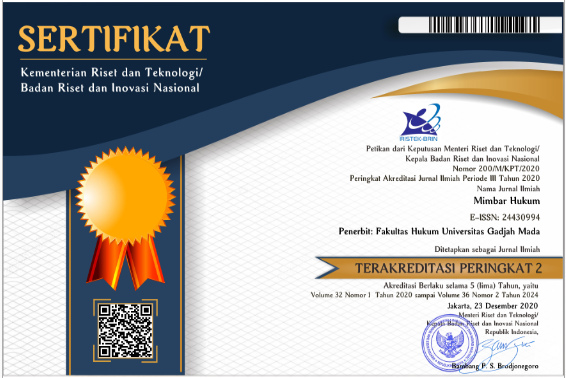PEMILIHAN KONSEP PERATURAN PERPAJAKAN UNTUK MENANGGULANGI DAMPAK ASYNCHRONOUS INFORMATION DALAM TRANSAKSI ELEKTRONIK DI INDONESIA
Anugrah Anditya(1*)
(1) Fakultas Hukum UGM
(*) Corresponding Author
Abstract
Abstract
Potential lost from taxation in Indonesia which came from an electronic transaction could happen due to asynchronous information between authority and tax payer. In electronic transacsions, the authority have no information as much as the taxpayer or party which directly involved during electronic transations. To overcome this condition Indonesia needs concept in exchange of information regarding taxation partuclarly in actual electronic transactions. Consideration for the concept to be chosen will include such as legal characteristic of current regulation and taxation reporting system for electronic transaction Indonesia.
Intisari
Potensi kehilangan pemasukan pajak di Indonesia yang berasal dari transaksi elektronik dapat terjadi karena adanya asynchronous information antara fiskus dan wajib pajak. Dalam transaksi elektronik fiskus tidak akan memilki informasi sebanyak yang dimiliki oleh pihak yang terlibat langsung dalam transaksi tersebut. Untuk menangani keadaan tersebut Indonesia memerlukan konsep pertukaran informasi yang akan digunakan dalam peraturan perpajakan dengan melihat keadaan saat ini. Pertimbangan dalam pemilihan konsep adalah karakteristik peraturan dan sistem pelaporan perpajakan yang timbul atas transaksi elektronik.
Keywords
Full Text:
PDFReferences
A. Buku
Deloitte, 2017, Shifting sands: risk and reform in uncertain times 2017 Asia Pacific Tax Complexity Survey, Deloitte Touche Tohmatsu Limited, United Kingdom
Inland Revenue Authority of Singapore, 2017, Record Keeping Guide for GST-Registered Businesses, Inland Revenue Authority of Singapore, Singapore.
Kemendag, 2016, Kemendag Perkuat Ekosistem E-Commerce dan Ekonomi Kreatif untuk Meningkatkan Daya Saing Produk Indonesia,Kemendag, Jakarta.
Organisation for Economic Co-operation and Development, 2014, Addressing the tax challenges of the digital economy, OECD Publishing, Paris
Piotr Stolarski, et al., 2008, Legal Framework for eCommerce Tax Analysis, Springer US, Boston.
B. Artikel JurnalKristiaji, B. Bawono, Asymmetric Information and Its Impact on Tax Compliance Cost in Indonesia: A Conceptual Approach, Tax Law Design and Policy Series, Vol. No. 0113, 2013.
C. Peraturan Perundang-Undangan
Peraturan Pemerintah Pengganti Undang-Undang Nomor 1 Tahun 2017 tentang Akses Informasi Keuangan Untuk Kepentingan Perpajakan (Lembaran Negara Republik Indonesia Tahun 2017 Nomor 95, Tambahan Lembaran Negara Republik Indonesia Nomor 6051).
Surat Edaran Otoritas Jasa Keuangan Nomor 16/SEOJK.03/2017 Tentang Penyampaian Informasi Nasabah Asing Terkait Perpajakan Dalam Rangka Pertukaran Informasi Secara Otomatis Antar Negara Dengan Menggunakan Standar Pelaporan Bersama (Common Reporting Standard).
D. Internet
Kompas, “Pengguna Internet di Indonesia Capai 132 juta”, http://tekno.kompas.com/read/2016/10/24/15064727/2016.pengguna.internet.di.indonesia.capai.132.juta., diakses pada 1 April 2017.
World Bank, “Tax Revenue GDP”, https://data.worldbank.org/indicator/GC.TAX.TOTL.GD.ZS?year_high_desc=false diakses 10 Oktober 2017.
Article Metrics
Refbacks
Copyright (c) 2018 Anugrah Anditya

This work is licensed under a Creative Commons Attribution 4.0 International License.




